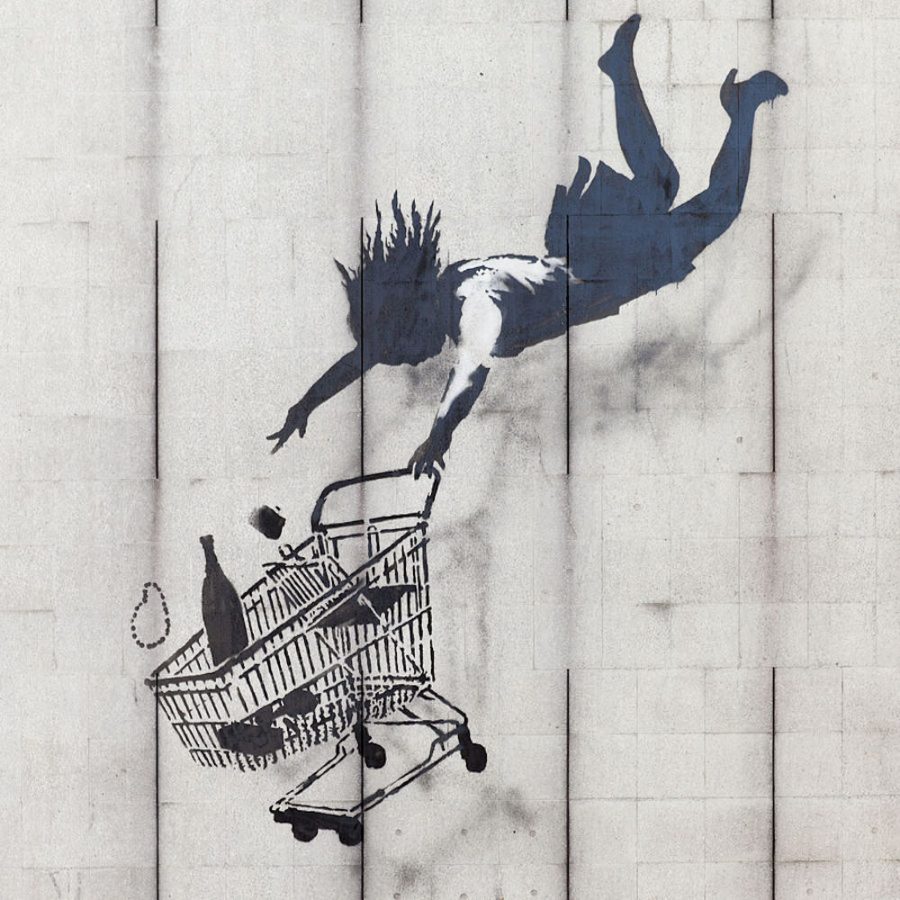This article was inspired by Roland Barthes’ Mythologies.
Think of a caged hamster running in his wheel for infinity, urged to run faster and faster to the point of exhaustion but prevented from ever reaching a final stop. The modern consumer is the 21st century embodiment of the caged hamster as he spins the wheel dominated by commercial powers. As long as the consumer succumbs to the rules of the game and chases after his irrational, predetermined objects of desire, the wheel will spin faster, leaving the poor hamster-consumer no choice but to keep running in a desperate effort to win a materialistic award that awaits at the finish line.
Supermarket-Wonderland
Supermarkets have changed over the past few decades. A short visit to one of the local chain stores reveals the monstrous commercial figures they have become and how proudly they fulfill that role. Even before entering the supermarket, the advertisements spread around the city say it all: images of happy families excitedly rushing through the aisles with their shopping carts, celebrating the heaven of endless purchase possibilities. Next to their bright smiles, the ads display some of the chain’s “hot deals” and bargains: from cereals to coffee, cleaning detergent to bread, each family member will find what they desire. Empty slogans extol the wonderful adventure of grocery shopping, equating it with any other family leisure activity, like hiking or going to the cinema. Who would’ve ever thought that grocery shopping could be so exciting, thrilling, and mind-blowing?
After creating such high hopes in the heart of the impotent consumer, the supermarkets must not let them down — and they certainly don’t fail in their task. The curious shopper enters the supermarket-wonderland and suddenly feels tiny and bewildered at the sight of long, endless aisles offering hundreds of types of products: 75 types of bread, 32 types of muesli, Bio, Vegan, Gluten-Free, Sugar-Free, Calorie-Free. This overwhelming abundance drowns the confused customer in a never-ending sea of options. The question of “which type should I choose?” quickly turns to “how can I try them all?” — and it’s at this very point that the game is over; the supermarket has triumphed. The basic list of necessary goods that the shopper jotted down and stuck in their pocket is carelessly neglected as they walk past the aisles, hypnotized and enchanted by sexy products on discount. They don’t need them, yet they buy them because at this stage the materialistic demon in them has broken free.
Tinder-World
The world of endless possibilities encompasses the realm of human relationships, no less in the shape of the commonly used app called Tinder. Tinder is a supermarket heaven — only instead of bread, muesli, or milk it displays a variety of potential acquaintances in any shape, size, and color to match one’s personal preferences. The app displays endless profiles of people toward which the user must rapidly declare their liking or dislike. There isn’t time for contemplation or thought; the user cannot move on to the next profile unless they make up their mind about the one that’s shown on-screen. If it’s a “no-go,” the next option pops up, and the one after, and so it continues… The game of Tinder is a loop of replacing, switching and exchanging at a rapid pace. This phenomenon is so powerful that it established the high status of a verb in the English language, turning it from banal to eerily amusing: swipe.
Swiping has become synonymous with a stroll in the supermarket between aisles of men and women categorized by their featured photos and any description they wish to share. As the consumer in this game, one has the power to choose the product that is most appealing and attractive. All borders or limits are pushed aside and this instant, innocent swipe can lead to anything from a casual chat to a sexual interaction. The seductive action of swiping right or left is so rapid and addictive that it encourages the user to regard others as mere objects, fabricated human beings. Tinder engineers one’s Eros by creating an illusion of the user’s control over their individual objects of desire: “yes, this person is just my type!”… but how in the world would one know?!
This might be the proper time to mention some of Tinder’s benefits that will perhaps clarify my skeptical yet not entirely disdainful approach towards it. Tinder has the ability to spark an ego-boost within seconds and relieve loneliness (be it even through the smallest interaction of empty texting), making it a blessed distraction from anything one wishes to avoid. It’s simply another player in the world of virtual relationships, which seems to increasingly dominate the world of real-life interaction. Such dominance will continue to grow regardless of the use of Tinder, as there are many other players taking part in the world of eye-catching illusions (Facebook, Instagram and Snapchat are just a few further examples).
The customer is thus the hamster trapped in their hyper-consumerism — their hunger knows no limits, and their appetite will never be satisfied. But what are we to tell that hamster? Will our moral conscience urge us to dump our phones or get rid of all social media? Shall we never enter the big supermarkets again? Clearly not. But it’s nonetheless a crucial time for self reflection that will open the door to a journey of an uncompromising search of the meaning of our daily routines, which seems at times to be lost. Those who are brave enough to question their own habits and social behaviour while reading these lines have already completed the first leg of the race.


Excellent writing!